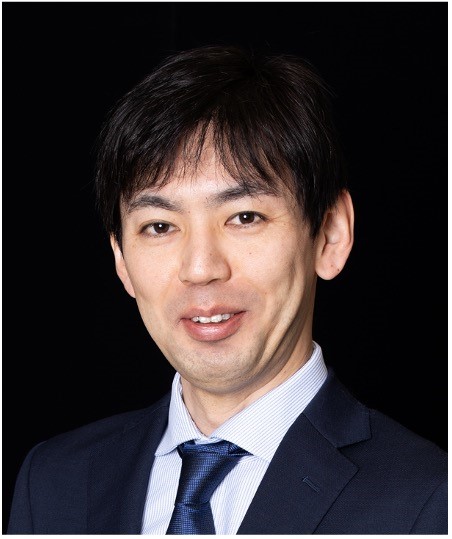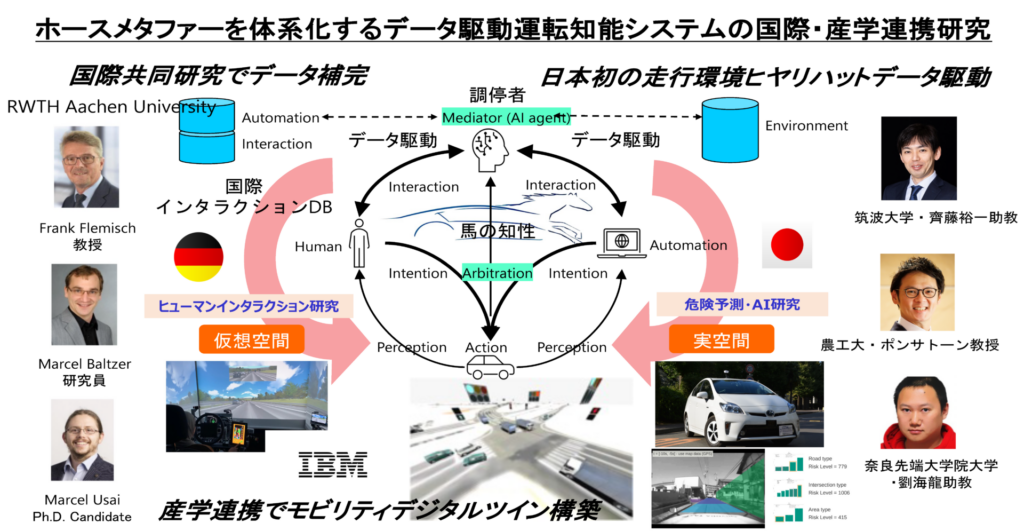第3期フェロー

齊藤 裕一
SAITO, Yuichi
筑波大学
システム情報系
助教
Assistant Professor
Institute of Systems and Information Engineering
University of Tsukuba
- 専門分野
Research fields - ヒューマンマシンシステム、ヒューマンファクター、システム安全制御
Human machine systems, Human Factors, System Safety and Control
- 研究テーマ
Research project - 人の意図を汲むホースメタファーを体系化するデータ駆動運転知能システムの国際・産学連携研究
International and industry-academia collaborative research on data-driven driving intelligence systems to systematize safety instincts and interactions in horses
- キーワード
Keywords - 危険予知、インタラクション、シェアードドライビング
Hazard anticipation, Human interaction, Shared driving
- 研究者総覧
Researchers Information - https://trios.tsukuba.ac.jp/researcher/0000004261
経歴
Biography
2015年3月 筑波大学大学院博士後期課程システム情報工学研究科リスク工学専攻 修了 博士(工学)
2015年4月 東京農工大学 機械システム工学科 特任助教
2019年4月 筑波大学 システム情報系 助教
2019年5月 東京農工大学工学府・工学部非常勤・産官学連携研究員
2015 Graduate School of Systems and Information Engineering, University of Tsukuba (Phd, Doctor of Engineering)
2015 Department of Mechanical Systems Engineering, Tokyo University of Agriculture and Technology, Research assistant professor
2019 Institute of Systems and Information Engineering, University of Tsukuba, Assistant professor
2019 Faculty of Engineering, Tokyo University of Agriculture and Technology, GIA Coordinate Researcher
研究概要
Research Outline

「自動化」は,人が担ってきた機能を機械に置き換える技術です.私は,「運転主体が人である」ことを前提に,限りある人機能を補う「人間中心の自動化」の思想の下で,危機の切迫度に応じて操作権限を人から機械へ(機械から人へ)「移譲」する安全機構を提案してきました.一方で,「インタラクション」は,相互(inter-)に応答(action)し合う能力です.移動の手段は,1900年頃,馬車から自動車に移りましたが,双方が「インタラクティブに対応する能力」は,継承できませんでした.共同研究者のアーヘン工科大学の Frank Flemisch 教授は,乗り手と馬の双方の意志を理解し合う能力を具体化させるホースメタファーの思想の提唱者であり,操作意図と権限を「共有」する協調機構(shared control)と共有度合を動的に変更させる機序を提案してきました.過去,人間は,より身体的な能力(ルールベースの行動)を獲得するために自動化システムを開発してきました.近年,内閣府の SIP-Adus や,欧州の自動運転プロジェクト Ko-HAF などでは,人の関与の余地なく自動化システムの安定作動の継続を志向した高速道での自動運転に着目します.一方で,今日,AI ベースの機械は,より認知的な能力(知識ベースの行動)を獲得しつつあります.データに基づく認知的な能力の獲得から自動化とインタラクションの機会を拮抗できれば,人の意図を汲むホースメタファーをデータ駆動シェアードドライビングという新たな価値として体系化できます.本研究では,人間中心の自動化と人間中心のインタラクションの思想の融合と実装を目指し,馬車が獲得していた危険の予知とインタラクティブに対応し合う認知的な能力を自動運転車としてどう設計できるかという問いへの学術的進展を構想します.
"Automation" is a technology that replaces functions that have been performed by humans with machines. On the other hand, "interaction" is the ability to respond (action) to each other (inter-). Around 1900, the means of mobility shifted from horse-drawn carriages to automobiles, but the ability for both parties to respond interactively was not inherited. Professor Frank Flemisch (collaborator) of RWTH Aachen University is a pioneer of the horse metaphor, which embodies the ability for both rider and horse to understand each other's intentions, and has proposed a mechanism for "shared control" in dynamically changing the distribution of control authority. In the past, humans have developed automated systems to acquire more physical capabilities (rule-based behavior). In recent years, SIP-Adus (Japan automated driving project) and Ko-HAF (European automated driving project) focus on automated driving on highways, oriented toward the continued stable operation of automated systems without any space for human involvement. On the other hand, today, AI-based machines are acquiring more cognitive capabilities (knowledge-based behavior). If we can balance automation and interaction opportunities from the acquisition of data-driven cognitive capabilities, we can systematize the horse metaphor as a new value of data-driven shared driving. This research aims to integrate and implement the ideas of human-centered automation and human-oriented interaction, and envisions academic progress toward the question of how we can design automated vehicles with the cognitive abilities that interact with the safety instincts acquired by horse-drawn vehicles.
私が目指すトランスボーダー研究者とは
What is my goal as a transborder researcher?
人知能に係る学問(心理と認知)と機械知能に係る学問(情報と機力)を繋げる学際研究領域(インタフェースとインタラクション)での国際共同研究を通じて,個々の文化や独自の視座に立った設計ビジョンの共有空間を構築し,従来の枠組みに囚われない新しいシステムを提案ならびに具体化していきます.
Through international joint research in the interdisciplinary research area (interface and interaction) that bridges the disciplines of human intelligence (psychology and cognition) and machine intelligence (information and mechatronics), we will build a shared design space for systematizing visions based on individual cultures and unique perspectives, and propose and materialize new human-AI/machine systems that are not constrained by conventional frameworks.
関連ページへのリンク
links
研究室HP:https://www.css.risk.tsukuba.ac.jp
個人HP:https://sites.google.com/site/py2dm7/
Lab HP:https://www.css.risk.tsukuba.ac.jp
Personal HP:https://sites.google.com/site/py2dm7/
ピックアップムービー
関連記事
Related article
- 2023/08/08
- 第3期TRiSTARフェロー認定証授与式を開催しました(2023年7月26日)
